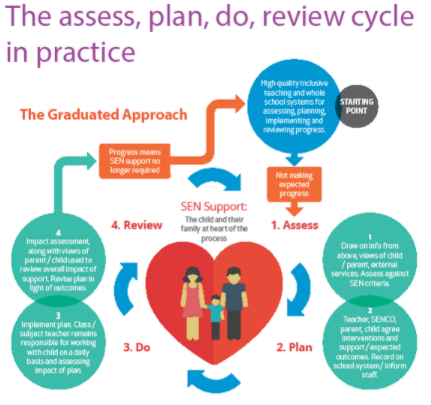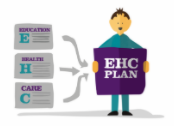Some students require educational provision, that is different from or additional to that normally available to pupils of the same age. Schools need to identify these children as early as possible, so longer-term interventions can be put in place. These students will be making less than expected progress, given their age and individual circumstances. This can be characterised by progress which:
- is significantly slower than that of their peers starting from the same baseline
- fails to match or better the child’s previous rate of progress
- fails to close the attainment gap between the child and their peers
- widens the attainment gap

Progress is not limited to attainment. Some children need to make additional progress with wider development or social needs in order to make a successful transition to adult life.

Additional learning needs can be identified at an early age, but, for many children, these needs emerge as they develop. Any adult working with children should be alert to emerging difficulties and respond early.
High quality teaching targeted at the area of need should be the first response to an additional learning need.
Slow progress and low attainment do not necessarily mean that a child has an additional learning need, but may be an indicator. Equally, progress in line with age-group should not
rule out an additional need.
How do we identify SEND at Nightingale?
At Nightingale Primary School we follow the guidance provided by the SEND Code of Practice 2014 to identify learning needs and difficulties and to put in place appropriate support. We follow the ‘Graduated Response’ approach.

This diagram shows how we identify a Special Educational Need or Disability and the steps that follow. Children who are identified as having an additional need are placed on our school SEND register as SEN Support. Some children make very good progress, or their needs change, and so may no longer need to be registered as SEN Support so may come off the register. We continue to closely monitor these children – the register is a working document and changes along with the needs of the child at different points in their schooling. This means that a child may come on and off the register as and when they need additional support.
SEND Support can be very varied and will be entirely dependent on the need of the individual child. It will be planned and co-ordinated with class based staff, the SENDCo, parents and, where necessary, outside agencies. These discussions will help to inform the provision that is needed which is ‘different from or in addition to’ the usual school activities and curriculum. Creating an ethos of independence is crucial in preparing the children for adult life.
Who is an EHCP for?

An EHCP (Education and Health Care Plan) is for any child or young person that has a significant and complex Special Educational Need or Disability. An EHCP is required when a child’s needs cannot be met by the usual support that is available to them in their school or setting.
Many children with SEND receive support in their school or setting without an EHCP, however their support would come from resources already available within school. This is called SEN Support. Following support at the SEN Support level, some children or young people’s needs may be deemed significant and complex and therefore require an EHC assessment by the Local Authority.
For further information, follow the link to the SENDIASS website.
Contact details, Local offer and policies
For more information please see the SEND Information Report and Policy below. To speak to the school SENDCo, Mrs Saunders, please contact the school office on 023 80613588.
